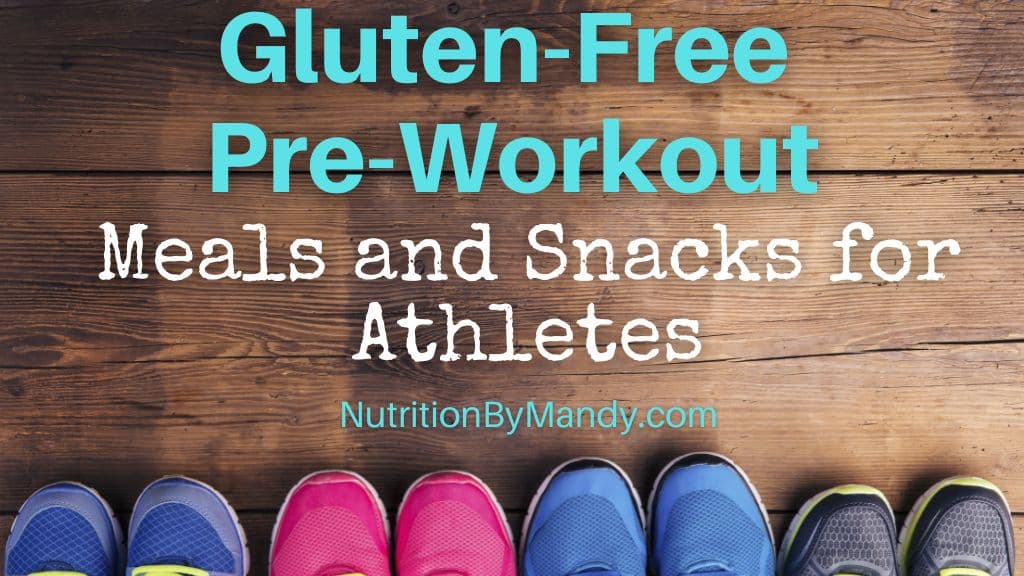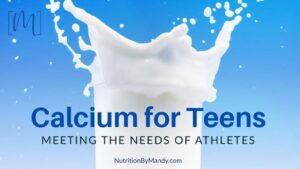Last Updated on January 8, 2026 by Mandy Tyler, M.Ed., RD, CSSD, LD
Gluten-Free Pre-Workout Meals and Snacks for Athletes
It is important for athletes following a gluten-free diet to know what to eat prior to a workout or competition.
Consuming the right foods at the right times can help ensure athletes are fueled to perform at their best.
Let’s take a look at what gluten is. Then we will explore the best gluten-free pre-workout meals and snacks for athletes.
What is Gluten?
Gluten is a naturally occurring protein found in wheat and other grains including barley, rye, and grains made by crossing wheat and rye. It helps provide texture, structure, and elasticity to food items (1).
Given its unique characteristics, processed foods may have added gluten to help the product maintain form and enhance texture.

Carbohydrates for Energy Pre-Workout
Carbohydrates provide the energy athletes need to perform at their best. Thus, carbohydrates should be at the foundation of an athlete’s pre-workout meal and snacks.
Given that wheat, barley, and rye are commonly used in breads, pastas, and cereals, athletes following a gluten-free diet may wonder what to consume pre-workout.
Fortunately, there are numerous ways that athletes following a gluten-free diet can meet their carbohydrate needs.
Gluten-Free Carbohydrate Ideas
- Fruit: Fresh fruit, frozen fruit, dried fruit
- Dairy: Milk, yogurt
- Starchy Vegetables: Potatoes, sweet potatoes, winter squash, corn, peas, beans, and lentils
- Other Grains and Seeds: Rice, quinoa, oats*
- Gluten-Free Products: Bread, bagels, pasta, breakfast cereal, granola, baking mixes
*Oats are considered high-risk for cross-contamination with wheat, barley, and rye during harvest and processing. The Celiac Disease Foundation recommends individuals on a gluten-free diet only purchase oat products specifically labeled as being gluten-free. In addition, athletes should visit with their doctor and dietitian prior to adding oats to their gluten-free diet.
Pro Tip: For additional information on gluten-free carbohydrate options, check-out my blog: Gluten-Free Carbohydrates for Athletes.

Planning Your Gluten-Free Pre-Workout Meal
It is important to consider the timing of meals and snacks eaten before a workout. In general, the less time you have prior to the start of the activity, the less food you will want to eat with your pre-workout meal.
When possible, aim to schedule your pre-workout meal to be eaten 3-4 hours prior to the exercise session.
Planning this meal several hours before the exercise session allows time for your body to digest the meal prior to activity. It also allows time to go to the restroom before the workout if needed.
Gluten-Free Pre-Workout Meal Ideas
When planning your pre-workout meal, it should include a good source of carbohydrates as well as a moderate amount of protein.
There are a variety of ways athletes can plan a gluten-free pre-workout meal that meets their needs.
- Peanut butter and jelly sandwich on gluten-free bread* with a banana
- Grilled chicken breast, steamed rice, green beans, and fresh sliced fruit cup
- Grilled salmon, baked sweet potato, steamed broccoli, gluten-free roll, and grapes
- Gluten-free pasta with marinara sauce, sliced chicken, and grilled vegetables
- French toast made with gluten-free bread* with fresh strawberries
- Greek yogurt parfait made with fresh berries and gluten-free granola*
- Fruit smoothie
*Udi’s® and Trader Joe’s® have a variety of gluten-free breads, bagels, granola, cereal, and other products available.

Planning Gluten-Free Pre-Workout Snacks
If you have less time before the workout (1-2 hours), focus on consuming a high-carb snack for energy.
Eating foods that are high in fat, fiber, and/or protein too close to the competition may cause GI distress during the activity (2).
Gluten-Free Pre-Workout Snack Ideas
- Banana, orange, grapes, or apple slices
- Dried fruit, fruit leather
- Applesauce squeeze pouch
- Gluten-free bagel
- Gluten-free pretzels – Snyder’s® and Snack Factory® both have gluten-free varieties.
- Gluten-free breakfast cereal – ChexTM, Nature’s Path®, and and CheeriosTM have a variety of gluten-free cereals available (read package to ensure the cereal you purchase is gluten-free).
- Gluten-free bars – MadeGood®, Nature’s Bakery®, and Annie’s® all offer a selection of gluten-free bars.
- Sports drinks, gels, chews, or bars (see note below)

Are Sports Drinks, Gels, Chews, and Bars Gluten-Free?
When picking out a sports drink, gel, chew, or bar to enjoy prior to a workout, make sure to read the ingredient label on the product closely.
Depending on the product, the item may be made with ingredients that contain gluten. Sports bars, in particular, may include gluten-containing ingredients, thus carefully reading the label is important.
To reduce your risk of inadvertently consuming gluten, choose a product that is labeled gluten-free or certified as gluten-free.
Hydration with Your Gluten-Free Pre-Workout Meal and Snacks
In addition to food, it is important to consider your hydration needs with your pre-workout meals and snacks.
Although hydration needs vary amongst individuals, there are some general pre-activity guidelines you can follow.
Hydration Before Activity
Approximately 4 hours prior to exercise, it is recommended that athletes drink 5-7 mL of fluid per kg of body weight (2). For a 165-pound athlete, this calculates to be ~13 – 18 fluid ounces.
Thus, drinking approximately 2 cups of fluid with your pre-workout meal can help you with meeting this goal.
In the hour leading up to the event, you can continue hydrating, aiming to drink around 8 oz of fluid during this time period.
Use Caution with Pre-Workout Supplements
It is also important to read the ingredient label closely if you are considering a pre-workout supplement. Carefully check the supplement’s ingredient list for possible gluten-containing ingredients.
Also use caution, as many pre-workout supplements contain added stimulants and mega-doses of nutrients that are not necessary prior to exercise.
Below are key tips to consider when reviewing a pre-workout supplement.

Is the supplement third-party tested?
Sports supplements are not regulated by the Food and Drug Administration in the same way that food is.
When a supplement is third-party tested an outside organization has evaluated the supplement for accuracy of ingredients. Two companies that evaluate sports supplements are NSF Certified for Sport and Informed Sport.
Does the supplement contain a proprietary blend?
Many supplements contain a proprietary or confidential blend of ingredients. The supplement label will typically list the ingredients within the blend, but not amounts.
Use caution with proprietary blends. If a product label does not tell you the name of the ingredient and the amount included, you cannot evaluate the potential effectiveness of the product.
In addition, you run the risk of consuming a gluten-containing ingredient within the blend.
In addition to caffeine, what stimulants does the product contain?
Many pre-workout supplements contain a variety of ingredients aimed at causing a stimulatory effect. These may be included in the pre-workout supplement as an “energy blend.”
Ingredients such as synephrine, green tea extract, and yerba mate all have stimulatory effects on the body and are often found in pre-workout supplements. The combination of stimulants could potentially have a synergistic effect in the body and be dangerous to your health.
Are the dosages of ingredients included in the pre-workout supplement based on research?
It is common to find mega-doses of vitamins, particularly B vitamins, in pre-workout supplements.
Many pre-workout supplements also contain ingredients such as creatine and beta-alanine, but not always in the dosages shown by research to be effective.
Similar to all dietary supplements, recognize that pre-workout supplements have the risk of being contaminated by banned substances. These substances could be harmful to your health or make you ineligible for athletic competitions (3).
If you are considering the use of a pre-workout supplement, seek guidance from a sports dietitian nutritionist. The sports dietitian nutritionist can review the supplement and provide guidance on the safety and efficacy of the product.
Plan Your Gluten-Free Pre-Workout Meals and Snacks

You are now set with a variety of ideas for gluten-free pre-workout meals and snacks.
Make sure to practice these meals and snacks prior to competition. This will allow you to ensure you have found the foods and beverages that work best for you.
Having a well-practiced sports nutrition plan in place can provide you with confidence that you are fueled to perform at your best.
For additional gluten-free tips, make sure to check out my blog with gluten-free breakfast on-the-go ideas for athletes.
Join the Nutrition By Mandy Email List & Get a Free Weekly Meal Planner Template
Click HERE to join the Nutrition By Mandy e-mail list. When you join you will receive a free weekly meal planner template to download and plan out your meals for the week.
About the Author
Mandy Tyler is a Sports Dietitian Nutritionist in the San Antonio, TX area. She is a Registered and Licensed Dietitian, a Board-Certified Specialist in Sports Dietetics, a Licensed Athletic Trainer, and is a Certified Exercise Physiologist through the American College of Sports Medicine. Mandy has experience working with athletes at the high school, collegiate, and professional levels. She believes the key to reaching one’s full potential, both in everyday life and in sports performance, relies on a healthy nutritional foundation.

If you are looking to take your performance to the next level, make sure to check out my new Sports Nutrition Game Day Guide. This downloadable guide is written to help athletes develop an individualized plan to achieve peak performance on game day.





